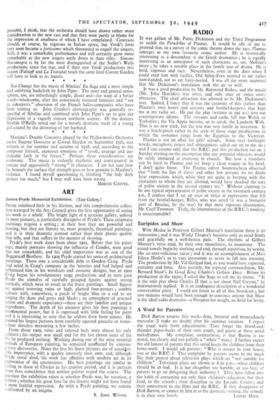RADIO
IT was gallant of Mr. Patric Dickinson and the Third Programme to tackle the Pseudolus of Plautus. It would be idle of me to pretend that, in a survey of the comic theatre down the ages, Plautus emerges as my own favourite comic author. He. is historically interesting as a descendant of the Greek dramatists ; he is equally interesting as an anticipator of such characters as, say, Moliere's miser ; he takes a notable place in the family tree of drama. He is bold, vigorous and racy. Nevertheless, even in the days when I could read him with facility, Old Splay-Foot seemed to me rather ham-handed, not to say hairy-heeled. I was all the more surprised that Mr. Dickinson's translation took the air so well.
It was a good production by Mr. Raymond Raikes, and the music (Mr. John Hotchkis) was witty, and only once or twice over- obtrusive. The chief attraction was allowed to be Mr. Dickinson's text. Indeed, I -fancy that it was the curiosity of this (rather than Plautus's own lovers and servants and brothel-keepers) that kept me at my radio set. He put the play (written in 191 a.c) into our contemporary idioms. The servants and cooks fell into Welsh or Yorkshire ; the Via Appia become, so to speak, the Lambeth Walk. This is no new trick, but the text was very fertile in invention. It was a hotch-potch rather in the style of those stage productions in which the costumes range from tly: Egyptian to the Victorian.
Plautus is not an affair for girls' schools. Some very forthright words, metaphors, tropes and objurgations sailed out on to the air ; and I can assume only that the B.B.C. put this prcduction out on a Sunday evening on the assumption that any potential objectors would be safely immured at evensong in church. But how a translatot can be loyal to Plautus and yet keep a clean tongue in his head, I don't quite know. The Plautus editor Sonnenschein observed that " from the lips of slaves and other low persons we no doubt hear expressions which, while they are quite in keeping with the characters to whom they are allotted, would have shocked the ears of polite society in the second century B.c." Without claiming to be any typical representative of polite society in the twentieth century A.D., I confess that I sat up once or twice at expressions that fell from the brothel-keeper, Ballio, who was acted (it was a favourite part of Roscius, by the way) by that most vigorous elocutionist, Mr. Cecil Trouncer. Truly, the intermittence of the B.B.C.'s modesty is unaccountable!














































 Previous page
Previous page